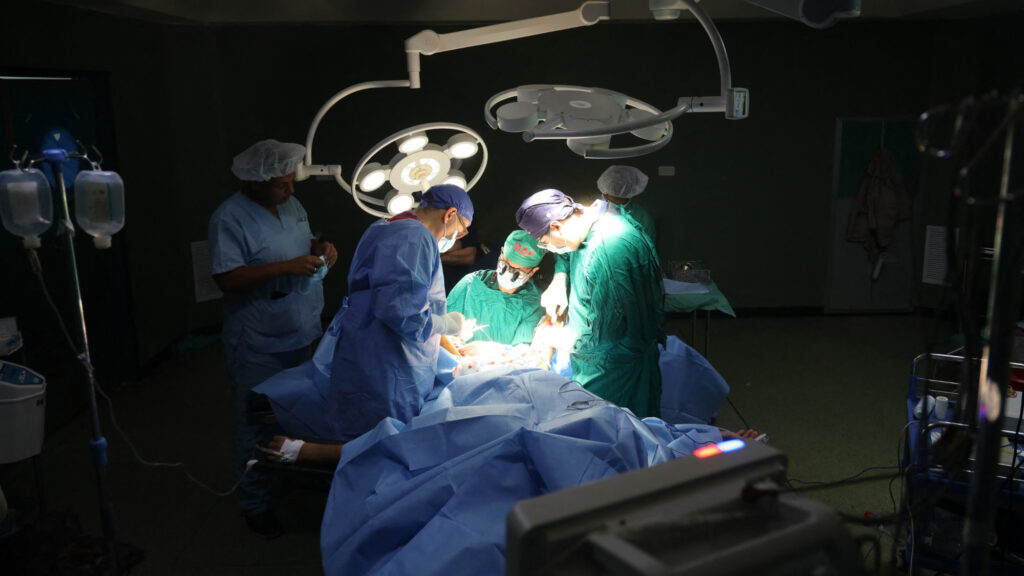The United Nations has warned that fuel shortages in Gaza under Israel’s ongoing blockade are pushing the humanitarian response to the brink of collapse.
For days, hospitals and aid agencies in Gaza have issued urgent appeals for international intervention to secure fuel deliveries, as shortages continue to cripple vital essential services for more than two million Palestinians.
Medical facilities have been forced to shut down electricity in some departments and suspend life-saving treatments such as dialysis, leaving patients on life support in critical danger.
On Wednesday, the UN confirmed that Israel permitted a limited shipment of fuel into Gaza, the first in over four months. However, the 75,000-litre delivery was far from sufficient, failing to cover even a single day’s needs.
In a joint statement issued on Saturday, UN humanitarian agencies said fuel supplies in Gaza had “reached critical levels”.
New MEE newsletter: Jerusalem Dispatch
Sign up to get the latest insights and analysis on
Israel-Palestine, alongside Turkey Unpacked and other MEE newsletters
Municipalities in central Gaza, where hundreds of thousands of displaced people are sheltering, announced on Sunday the complete suspension of all essential services due to the total depletion of fuel.
“When fuel runs out, it places an unbearable new burden on a population teetering on the edge of starvation,” the UN said in its statement.
“Without adequate fuel, UN agencies responding to this crisis will likely be forced to halt their operations entirely, directly impacting all essential services in Gaza.
“This means no health care, no clean water and no capacity to deliver humanitarian aid.”
Civil defence crippled
Mohammad Basal, spokesperson for Gaza’s Civil Defence, told Middle East Eye that repeated pleas for fuel over recent weeks have gone unanswered, leaving emergency teams and civilians increasingly at risk.
The crisis has effectively crippled the sector’s ability to function, placing both rescue teams and civilians in growing danger, Basal said.
The Civil Defence requires a minimum of 500 litres of fuel each day to maintain basic operations, he added.
According to Basal, Israel has provided no official fuel allocations for Gaza’s Civil Defence, and international humanitarian organisations have failed to bridge the gap.
‘Imagine calculating every kilometre of a rescue mission, worrying whether the 20 litres in the tank will be enough to get back alive’
– Mohammad Basal, Civil Defence spokesperson
With supply routes blocked and fuel reserves depleted, crews are now dependent on donations, black-market purchases or synthetic fuel made from recycled plastic, an unsafe and unsustainable alternative.
“We’ve resorted to using locally produced synthetic fuel, but it causes serious damage to our already fragile vehicles,” Basal warned.
The shortage has forced the Civil Defence to make painful choices, often deciding which emergencies to respond to and which to leave unanswered.
“We’re scaling back our responses drastically, trying to avoid a total shutdown of our vehicles and services,” Basal said.
“Imagine calculating every kilometre of a rescue mission, worrying whether the 20 litres in the tank will be enough to get back alive.”
In some cases, rescue vehicles break down mid-mission due to a lack of fuel, stranding crews inside active strike zones.
“If the vehicle runs out of fuel mid-mission, we’re stuck in the danger zone,” he explained.
“You’re faced with two options: abandon the vehicle and flee, or push it by hand out of a strike area. Neither is safe.”
Hospitals on the verge of shutdown
Ismail al-Thawabteh, director general of Gaza’s Government Media Office, has warned that despite the limited entry of fuel last week, regular supply remains blocked, pushing the healthcare system to the brink of collapse.
He described the ongoing Israeli blockade as “a flagrant violation of international humanitarian law that endangers the lives of hundreds of thousands of civilians”.

Israel’s blockade of Gaza is ‘tool of extermination’
Read More »
Thawabteh told MEE that most hospitals are on the verge of a complete shutdown, with vital services grinding to a halt due to the fuel shortage.
“More than 9,000 people have already died due to a lack of access to treatment, the closure of border crossings and the absence of fuel required for life-saving surgical operations,” he said.
He added that over half a million urgent surgical procedures are currently pending in Gaza’s hospitals.
“But without fuel, performing them is impossible.”
Thawabteh renewed his appeal to the international and Arab communities to intervene before the situation worsens further.
“The crimes committed by the occupation against hospitals and the healthcare system must be condemned,” he said.
“The siege must be lifted, crossings opened immediately, and fuel and medical aid allowed in without delay.”

